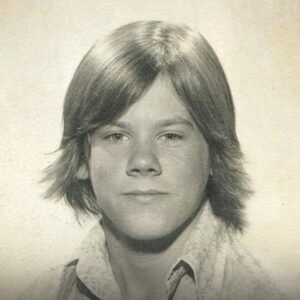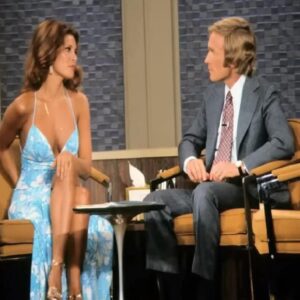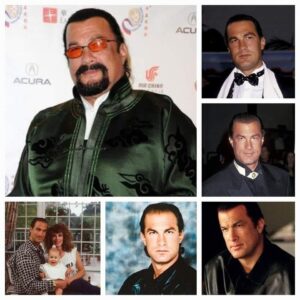After earning a slew of accolades for creating a compelling alternate-history version of present-day Tulsa, Damon Lindelof finally made it to the real place.
The creator of HBO’s hit 2019 limited series “Watchmen,” which has been widely credited with introducing the often-overlooked history of the 1921 Tulsa Race Massacre to the general public, Lindelof participated in a panel about the show Sunday at the Black Wall Street Legacy Festival, one of the events organized to mark the massacre’s 100th anniversary. Although he dedicated many of the show’s awards to the survivors and descendants of the race massacre, the COVID-19 pandemic prevented Lindelof from visiting sooner.
“We always understood that what happened here was a real thing, even though we were making a piece of fiction. And when you come to a real place, you feel what happened there. So, still processing,” Lindelof said Sunday night from the stage on the grounds of Oklahoma State University-Tulsa in the historic Greenwood District.
“It was emotionally overwhelming and intense, and we’re just really grateful that we get to be here.”

Getting history trending
The “Watchmen” panel, which closed out the main stage at the Black Wall Street Legacy Fest, also featured Cord Jefferson, who won one of the series’ 11 Primetime Emmy Awards for co-writing with Lindelof the hard-hitting episode “This Extraordinary Being”; Nehemiah Frank, founder and editor-in-chief of The Black Wall Street Times; and Jeff Martin, president of the board of the Tulsa Literary Coalition and co-founder of Tulsa’s Magic City Books.
“We just had a lovely dinner with a number of people, and one of them was Tim Madigan, who wrote ‘The Burning,’ which was a hugely important text for us when we were researching the show and researching what happened in Tulsa,” Jefferson said.
“To start reading that book in 2017, not really knowing what the show was going to be, to being here in Greenwood four years later, eating dinner with Tim Madigan … it feels surreal. But I’m incredibly grateful to be here.”
Adapted from the trailblazing 1986-87 DC Comics series “Watchmen” by writer Alan Moore and artist Dave Gibbons, Lindelof’s set his 2019 series in an alternate history about 30 years after the graphic novel’s 1980s events. The series takes place in Tulsa, often references the iconic musical “Oklahoma!” and stars Tulsa native Tim Blake Nelson, along with Regina King, Jeremy Irons, Don Johnson, Louis Gossett Jr., Jean Smart and Yahya Abdul-Mateen II.
But the series begins its fantastical, fictionalized exploration of real-life social issues, particularly racism, with a harrowing account of the 1921 Tulsa Race Massacre, one of the worst episodes of racial violence in U.S. history.

Between May 31 and June 1, 1921, mobs of white residents attacked, set aflame and ultimately devastated Tulsa’s Greenwood District, which was at that time one of the wealthiest Black communities in the United States, earning it the name “Black Wall Street.” The deadly tragedy was covered up for decades and omitted from history books.
“The biggest refrain from this … was, ‘Was that a real thing that happened?’ That was happening all over the world,” Martin said. “It wasn’t trending about ‘Watchmen.’ … What was trending after the show happened was the Tulsa massacre. People wanted to know more about it. And art and popular culture … when they function at their highest level, can do things like that.”
A race massacre descendant, Frank shared his emotional reaction to seeing the event re-created on “Watchmen’s” October 2019 debut episode.
“I remember I was sitting with my mom, and we didn’t even talk. We were just silent just watching the whole thing. I remember getting up the next day and writing about how accurate I thought it was,” Frank said.
“After watching it, I just kind of collapsed into myself and just sat with that. And I actually cried. My mother cried. I’m thankful that you produced such a great piece of work to educate people, but it was traumatic. I was traumatized thinking about like, ‘Wow, my people went through that.'”

History books, not crystal balls
Although the COVID-19 pandemic prevented him from visiting Tulsa sooner, Lindelof clearly kept the place on his mind. Last summer, he donated $19,021 to the 1921 Tulsa Race Massacre Centennial Commission with a challenge to raise matching funds. Oklahoma Humanities matched his challenge to double the fundraising impact, with the money going to the new Greenwood Rising history center.
“‘Watchmen’ is essentially about superheroes, but hopefully set in slightly more real-world situations. So, Batman is in Gotham City and Superman is in Metropolis. … We always wondered, why did Superman and Batman give the (Ku Klux) Klan a pass? They were fighting crime in the ’40s and ’50s, and ’60s and ’70s. Why didn’t the superheroes never get involved in civil rights or racial justice?’ And the answer is because they were white guys; they had no skin in the game,” Lindelof said.
“One of the writers in the room told the joke that was like, ‘Why does Batman show you the bottom half of his face? Because he wants you to know that he’s white.’ Because he can he can get away with basically doing whatever the hell he wants in a way that a superhero of color would not be able to. So, the idea was that these guys are not cops, they’re Klansmen who masquerade as cops; they’re not cops who masquerade as Klansmen. And that wasn’t just happening in the 1940s and ’50s.”

Since the 2020 murder of George Floyd while in police custody and the subsequent nationwide protests, the Peabody Award-winning series has been hailed as prophetic as America has grappled anew with racial injustice and inequality.
“We didn’t have crystal balls in the room; we had history books,” Jefferson said. “If you read history books, you know that this kind of behavior is bound to repeat itself over and over and over again in this country, unfortunately.
“Had this show not premiered in 2019, it might not have sort of been around George Floyd and everything. But had it not premiered in 2019, you would have Rodney King or Trayvon Martin or Amadou Diallo, or any number of Black people that have been killed by, very frequently, white authority figures in this country. … It’s not prescient, we were just writing about what happens in this country in sort of the way history repeats itself in America.”






